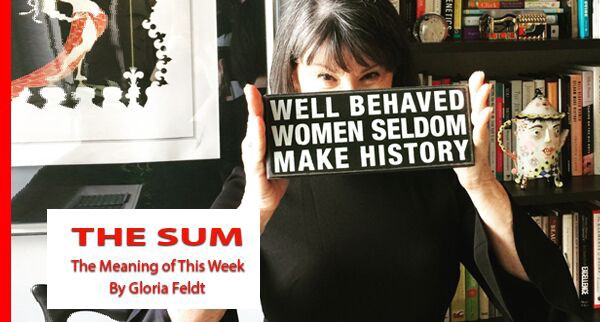Serena, Bianca, Friends at 25 and 3 Powerful Leadership Lessons From the Woman Who Played Chandler's Father
Issue 107 — September 8, 2019
Some great tennis was played at the U. S. Open last week. While many people were focused on the generational change among the top players — as Serena Williams was defeated as she tried for a historic 24th win by 19-year-old Bianca Andreescu — I was more fascinated by #SisterCourage behavior among the female players.
(Credit: Clive Brunskill/Getty Images)
It had started with Naomi Osaka sharing the spotlight with the 15-year-old Coco Gauff.
The women’s graciousness to one another while at the same time competing fiercely demonstrates their recognition that there is no finite pie of power — by sharing it they all had more.
Tennis fans got their money’s worth of drama. Meanwhile, fans nostalgic for the television series “Friends” are having a month-long opportunity to revisit their favorite characters.
This month marks the 25th anniversary of its first show. New Yorkers will even get to visit a pop up of Central Perk and buy “Friends” merch.
I went to drop off some of my deservedly famous green chili stew to Kathleen Turner, who famously played “Friends” character Chandler’s father Charles, a transgender woman performing in a Las Vegas drag show, when she told me that she was planning to attend a cast reunion.
Kathleen is a great friend, and she loved the irony of playing Charles.
You might know Kathleen Turner from her starring roles in blockbuster films like Body Heat, War of the Roses, or Serial Mom. Or from her lauded stage performances such as Mrs. Robinson in The Graduate, Martha in Who’s Afraid of Virginia Woolf. Possibly you’ve seen her as television cameo characters like Chandler’s father or, more recently, an ex-wife on the “Kominsky Method.” You might even have recognized her iconic voice as the feminist doll maker Stacy Lavelle in “The Simpsons.” The woman never stops working.
A few years ago, I had the privilege of writing the book Send Yourself Roses with Kathleen, about her life and leading roles.
Each chapter has specific lessons or messages that Kathleen wanted to give — in fact, she said to me at the outset that her purpose for the book would not be the typical celebrity tell all, but to share what she’d learned that would be useful to other women.
Here are three of my favorites from among the leadership lessons I learned from Kathleen. And while watching the Open, I saw these in action among the female players.
Be essential in any role you play.
About being essential, Kathleen says,
“One thing that has always been important to me throughout my career is this: Every character I play has to be necessary to the story. In other words, if the story would make sense without that character, then I won’t play her. She must be essential.”
To me, as someone who had given my life to a cause and had allowed myself to be subsumed by it, the thought of embracing this level of intention hit me like a ton of bricks because it is so very true, and it is informing my current focus on the power of intention.
2. Don’t repeat your successes.
This one really got me thinking about how most of us focus on trying to get better and better at one thing we do or aspire to do and rarely are deliberate about taking up or taking on something completely out of our wheelhouse. But Kathleen calls herself a serial risk taker, a nod to her role in John Waters’ weird film, Serial Mom. It’s an accurate description of how she chooses roles. She doesn’t want to be typecast. That keeps her options open for the next role.
It’s why after playing the sultry, sexy, scheming Matty in Body Heat, she deliberately sought a comedic role and played Delores against Steve Martin’s classic The Man With Two Brains. After that, the mousy and shy Joan Wilder in Romancing the Stone. And so on. She says, “I take risks not just for the thrill — though I do enjoy the thrill — but for the learning…Risk is the willingness to fail.”
Kathleen and I spent about six months working on the book at a time in my life when I was most vulnerable, having left an intense 30-year career that had defined my life and shaped how people thought of me. Learning about how Kathleen had intentionally chosen to do completely different roles freed me to do the same. As a matter of fact, writing the book where I was telling another person’s story was a huge stretch for me and something I had never done before. There was magic in getting completely outside of my comfort zone. I doubt that I would have cofounded Take The Lead without this idea. I was certainly not repeating my successes.
Kathleen Turner and I doing a book talk about Send Yourself Roses at the 92nd Y in New York.
3. Banish the yet.
Kathleen lived in countries around the world until her father, who was in the foreign service and whom she very much loved and admired, died suddenly when she was 17. I think that early experience with a shocking loss must have instilled within her a sense that you can’t wait to do or be what you think you want.
“Turner is a verb,” she says. She observes that many people will refrain from taking a risk or taking a stand because they feel they aren’t ready, don’t yet know enough, aren’t old or wealthy enough yet, and so on. But, she says,“That yet is a thief. It can rob you of yourself in the moment. ‘Yet’ means you are going to make a contribution someday. But each of us has so much to give right now.”
I love that advice — it’s so true. And if leaders don’t model that penchant for action, others in our team may well hold back too.
I’ll share much more about these three leadership lessons next week on my podcast, Take The Lead Women. Be sure to subscribe now so you’ll never miss an episode. And share the podcast with your friends. By helping grow this show — you’re helping women everywhere Take The Lead in their own lives.
Speaking of women who banish the yet, join me for this podcast, when my guests are two outstanding, risk taking entrepreneurs, investor and author of Leapfrog: The New Revolution for Female Entrepreneurs Nathalie Molina Nino and Nina Vaca, Chairman and CEO of Pinnacle Group, one of the fastest growing women-led companies in the country.
Click here to listen to Episode 9.
And do join me and cohost Reshma Gopaldas for our free live monthly Virtual Happy Hour at 6:30 pm EST/ 3:30 pm PST September 11, when I will have the pleasure of introducing you to two other amazing entrepreneurs who blazing trails and disrupting industries. Heli Prilliman, Founder and CEO of Laquerbar who is overhauling the antiquated $20 billion nail industry and Denise Lee, CEO and Founder of Alala modern activewear (my absolute favorite!) company.
GLORIA FELDT is the Cofounder and President of Take The Lead, a motivational speaker and expert women’s leadership developer for companies that want to build gender balance, and a bestselling author of four books, most recently No Excuses: 9 Ways Women Can Change How We Think About Power. Former President of Planned Parenthood Federation of America, she teaches “Women, Power, and Leadership” at Arizona State University and is a frequent media commentator. Learn more at www.gloriafeldt.com and www.taketheleadwomen.com. Tweet @GloriaFeldt.






